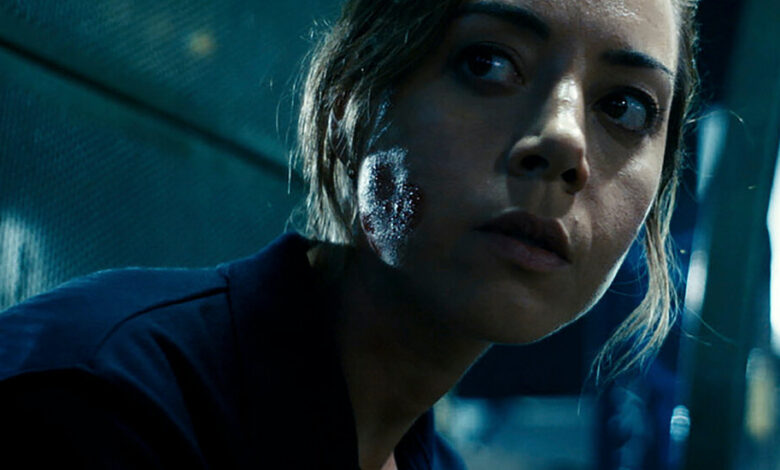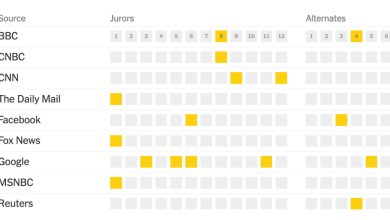The Reinvention of Aubrey Plaza

In “Emily the Criminal” (now in theaters), Aubrey Plaza plays a hapless, desultory young woman weighed down by student loans like Atlas by the Earth. Because of her police record, Emily can only hold down a food delivery job. Her prospects are grim. When a man named Youcef (Theo Rossi) offers Emily employment as a dummy shopper, purchasing valuable goods with sham credit cards, she accepts, hesitantly at first, then with gusto; lucrative payouts outweigh the hazards and amorality, so Emily digs herself deeper into this scammer world until she hits illicit subsoil.
Plaza sweats anxiety and breathes determination. Partly that’s the performance. The combined conditions of life as a black-market capitalist and life as 30-something jetsam circling a debt whirlpool keep Emily rotating through states of sober agency and abject alarm. Partly, though, Emily’s grit is Plaza’s. The nerves could be, too. Whether she has something to prove as an actress or she’s too self-assured to care, Plaza has continually reinvented herself with roles she has taken both during and after her seven-season stint on the hit political comedy series “Parks and Recreation”; she’s been eminently watchable since 2009, but in “Emily the Criminal,” Plaza fully cements her charisma in pathos.
Raunchy rom-coms (“The To Do List”), dark comedies (“Ingrid Goes West,” “The Little Hours,” the recently released “Spin Me Round”), D.I.Y. time travel adventures (“Safety Not Guaranteed”), the occasional horror film (“Life After Beth,” the 2019 “Child’s Play” reboot), reality-bending art films about reality-bending art films (“Black Bear”); as “Parks and Recreation” ran, and particularly on approaching its 2015 conclusion, Plaza steered her image as the sardonic, disaffected intern April Ludgate into fresh domains. She did that not by abandoning the characteristics of cynicism and apathy that defined Ludgate, but by reframing the way those qualities shape her performances.
Like Emily, Plaza pivoted cautiously to start. Change invites risk, which she attenuated by making only slight alterations to her persona, starting with “Funny People” (2009). In Judd Apatow’s film, she played a standup aspirant courted by the movie’s protagonist (Seth Rogen); in a nod to Plaza’s tendency to deadpan lines, Rogen’s character asks head-on if she’s joking or serious about seeing Wilco with him. (She’s serious. She’s also teasing him.)
Plaza revisited this dynamic eight years after “Funny People” in the sprawling “Decameron” riff “The Little Hours,” directed by Jeff Baena (her husband), where she portrayed the irascible Sister Fernanda. “That’s just the tone of my voice,” she mutters as Bishop Bartolomeo (Fred Armisen) castigates her for “abusive language,” one venial sin cataloged with mortal ones. Between these films, Plaza took opportunities to tinker with her deadpan reputation. Hal Hartley’s “Ned Rifle” (2014), where Plaza played a young woman seeking the man who took her virginity when she was 13, is contained by a mordant serio-comic atmosphere Plaza was tailor-made for; “Safety Not Guaranteed” (2012) and “The To Do List” (2013) let Plaza express impassivity as a product of loneliness, the former because of grief, the latter because of social guilelessness.
Other Plaza films don’t permit those nuanced distinctions. “Scott Pilgrim vs. the World” (2010) baldly capitalized on Plaza’s dry rancor in a tertiary role as caustic nuisance Julie; “An Evening with Beverly Luff Lin” (2018) relied on the Ludgate demeanor to facilitate the director Jim Hosking’s preference for wry delivery and affectation. Neither movie gave Plaza much room to change the perception of her style.
“Being funny with doing nothing at all is a skill that some people have honed that is really hard,” Plaza told Rogue Magazine in a 2017 interview, laying out her frustrations with the “deadpan” label. In the following five years, in keeping with that sentiment, she pushed herself toward her best work: “Ingrid Goes West,” “Black Bear,” and now, “Emily the Criminal.” In each, she says everything she needs to with expression more than words. “Ingrid Goes West” (2017) repurposes the deadpan as a way of signifying alienation because of media dependency; her tone is flat by default because she’s out of practice with social interaction, not because she’s a malcontent. In “Black Bear” (2020), deadpan is Plaza’s defense mechanism as a bystander to the disintegration of a dysfunctional couple (played by Christopher Abbott and Sarah Gadon).
With “Emily the Criminal,” Plaza layers the excruciating tensions of “Black Bear” and the mental freakouts of “Ingrid Goes West” over her character’s needful plunge into the grifter underworld: Emily breaks laws because she has a reason to, not because she wants to, and the film’s pulse quickens as her circumstances grow more dire. Emily maintains a steady exterior calm veiling her interior panic. The most she loosens up is doing cocaine bumps in a bathroom bar with her friend Liz (Megalyn Echikunwoke); here, the deadpan softens. On her first job for Youcef, Emily’s face betrays nothing to the cashier ringing up her pricey 4K TV. On the next, her ruse misfires and the deadpan falters; the mark assaults her and pursues her in a white knuckle car chase, which she manages to win.
Neither a bloody nose nor raw terror are sufficient for Emily to give up. Plaza plays the aftermath of the attack as an awakening: Emily apparently has a latent talent for fraud, a hustler’s backbone, iron will and a poker face any gambler would die for. Plaza relishes that face outplaying men who undercut her, repelling would-be muggers attempting to steal her supply and flirting with the clumsy, handsome Youcef.
“You think I don’t know how to do ice?” she replies when he advises her on the finer points of tending wounds, incredulous, mocking and playful all at once. The moment epitomizes Plaza’s acting sensibility: She’s having a good time but she doesn’t want anyone to know.





